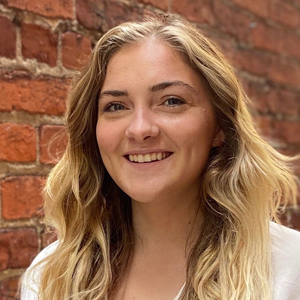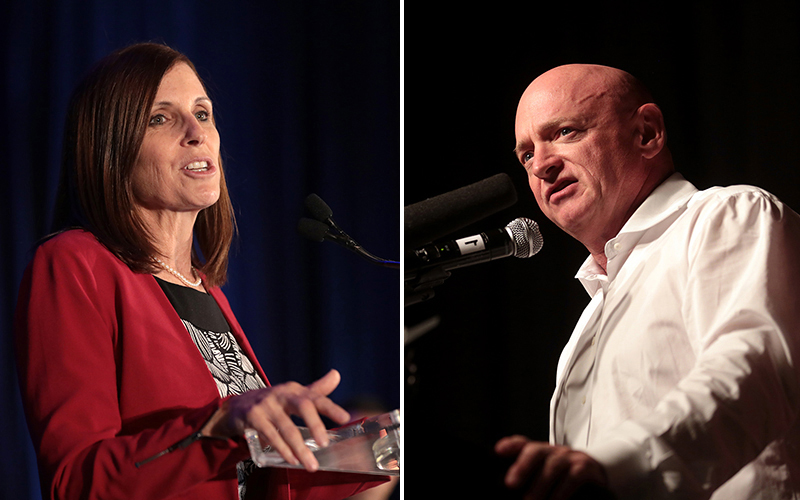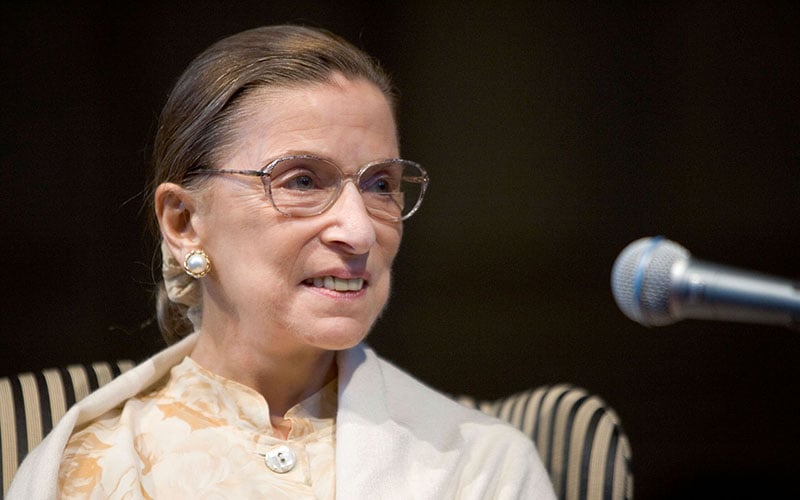WASHINGTON – Arizona’s already high-profile Senate race drew new attention with the death of Supreme Court Justice Ruth Bader Ginsburg and news that a new Arizona senator could be seated in time to vote on her replacement.
With Democratic challenger Mark Kelly currently leading Sen. Martha McSally, R-Arizona, in both polling and fundraising, Democrats could move one vote closer to blocking Senate Majority Leader Mitch McConnell’s plan to push through a nominee before the end of the year.
“There’s a lot of uncertainty added to uncertainty, given the pandemic and increased mail-in-voting this year,” said Jessica Taylor, the Senate and governors editor for the Cook Political Report. “But if Kelly wins, that would bring them (Senate Republicans) down a seat they need.”
Taylor and others say it is not clear yet how much the Arizona race will be affected by the fight over Ginsburg, who died Friday of metastatic pancreatic cancer. But the fight has already motivated partisans nationwide.
Act Blue, a fundraising platform for Democrats, said from 8 p.m. Friday until the end of the day Saturday, it raised $91.4 million from 1.5 million donors, breaking records for both dollars and donors in a single day and a single hour.
“The record-breaking response we’ve seen from small-dollar donors shows that the left is eager to fulfill her final wish and ready to fight back against (President Donald) Trump and McConnell’s vow to push through a Supreme Court nominee,” said a statement from ActBlue Executive Director Erin Hill.
Trump said Monday that he plans to nominate a woman and that he expects to narrow down a current list of five potential nominees to a final choice by Friday or Saturday – less than seven weeks until Election Day.
Democrats have insisted that Ginsburg’s seat should not be filled until after the election, pointing to McConnell’s refusal to consider President Barack Obama’s last nominee for almost all of 2016 because it was an election year and the voters should be heard first.
But McConnell said Friday, within hours of Ginsburg’s death, that Trump’s nominee “will receive a vote on the floor of the United States Senate.” McSally tweeted her support of that plan Saturday, saying, “This Senate should vote on President Trump’s next nominee for the U.S. Supreme Court.”
Whether that means before or after the election is not clear and McSally’s campaign office on Monday declined further comment. The Kelly campaign did not respond to requests for comment Monday.
Sen. Kyrsten Sinema, D-Arizona, also declined to say when a vote should be held. Her office only referred to a statement in which Sinema praised Ginsburg, who she said “inspired me and countless others.”
Republicans currently hold 53 seats of 100 in the Senate. But because McSally was appointed in 2018 to fill the seat of the late Republican Sen. John McCain, she only holds the seat until the next election. Which means if Kelly wins, he could be sworn in before next year.
But while the Supreme Court fight has drawn attention, analysts say it’s unclear how Ginsburg’s death might affect the McSally-Kelly race, with the most-partisan voters already committed.
“People triggered by the Supreme Court were probably already planning to vote and had made up their minds … before Ginsburg’s death,” Nathan Gonzales wrote Sunday in Inside Elections.
Taylor said the court vacancy has shifted “the issue of judicial nominations front and center,” and conservatives usually vote heavily based on potential Supreme Court nominations. But she does not think it will be enough for McSally.
This U.S. Senate should vote on President Trump's next nominee for the U.S. Supreme Court.
— Martha McSally (@SenMcSallyAZ) September 19, 2020
“If she does begin to shore up her standing with conservatives by supporting McConnell, I don’t think that’s enough to close the gap in this race at this point,” said Taylor, adding that the Arizona Senate has started to “lean Democrat.”
As of Friday, a roundup of polls by RealClearPolitics showed Kelly leading McSally by 6.7 percentage points, a lead he has held for much of the race.
Kelly also maintains a sizable fundraising advantage over McSally in what has become one of the most expensive Senate races in the country. Federal Election Commission reports from June 30 showed Kelly had raised $46.1 million and had $21.2 million on hand, compared to McSally’s $30.4 million in donations and just under $11 million in the bank.
“We’ve seen Mark Kelly have the advantage in public and private polling very consistently over the past few months and that’s a very precarious position for an incumbent like McSally to be at,” Taylor said.
Taylor believes McSally has “drifted further right” since 2018, which could harm her odds of winning in a state that is shifting left. She also said she does not think the Senate will be able to get a confirmation vote before the election, so it is likely the winner in Arizona will get the vote.
The House does not play a role in the confirmation, but Arizona House members split down party lines on when the Senate should act to fill the vacancy.
Rep. Paul Gosar, R-Prescott, said “Supreme Court vacancies are always political but this one promises to be especially so. With 45 days left until the election, it is imperative that we fill the seat now!”
But Rep. Raul Grijalva, D-Tucson, said his “thoughts are with her family and those across the country mourning her death. I urge the Senate to respect her dying wish to not replace her until after the results of the very near presidential election.”
-Cronkite News reporters Olivia Munson and Claire Chandler contributed to this report.


